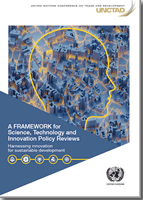
Strengthening the technological capabilities of developing countries will be critical for the achievement of the 2030 Agenda for Sustainable Development. Focused national efforts are needed, backed by international support.
As the focal point within the United Nations on science, technology and innovation (STI) for development, UNCTAD’s policy analysis, consensus-building and technical cooperation help strengthen technological and innovation capabilities in developing countries, improve innovation performance and embed STI within the national development strategy.
A key component of this undertaking is the Science, Technology and Innovation Policy (STIP) Review programme that provides tailored technical support to countries in assessing national STI systems and designing or reframing national STI policies and plans.
STIP reviews have been shaped by the outcomes of successive UNCTAD conferences, and the deliberations and experience-sharing in the United Nations Commission on Science and Technology for Development (CSTD). As of the end of 2018, UNCTAD had completed STIP Reviews in 14 countries, in which the reviews have often ignited a renewal in STI policy, raised the profile of STI policy in national development strategies and facilitated the inclusion of STI activities in international cooperation plans.
UNCTAD XIV (Nairobi, 2016) mandated the organization to continue and enhance the STIP Review programme, and to do so in the light of the 2030 Agenda for Sustainable Development.
The methodological framework for STIP Reviews has therefore been redesigned to assist countries in aligning STI policy with their development strategies, while ensuring that STI policies promote sustainable development and help achieve the Sustainable Development Goals.
Building on the established approach of addressing the fundamental issue of how STI can support the economic development goals of growth, higher productivity, structural transformation and economic diversification, the revised framework considers the role of STI in reorienting development towards more inclusive and environmentally sustainable outcomes.
A key feature of STIP Reviews is the systematic effort made to involve a broad range of stakeholders. This participatory process can mobilize networks of actors towards transformation through policy experimentation and learning.
The STIP Review process thus opens a multi-stakeholder dialogue that can generate consensus among STI policymakers and development stakeholders on future lines of action and cement the ownership of related policy programmes.
This publication is intended to provide policymakers and other stakeholders with a guide to the new thinking that underpins the programme.
The new framework presents an ambitious vision for transformative STI policymaking that advances an inclusive and sustainable development agenda. It calls for commitment to an inclusive process involving a broad range of social actors. It also requires flexibility in tailoring the process to each country’s specific concerns, priorities, development trajectories and policy needs.
Most importantly, it relies on a shared vision among all stakeholders of the power of STI to drive global development that leaves no one behind.
Shamika Sirimanne
Director, Division on Technology and Logistics




